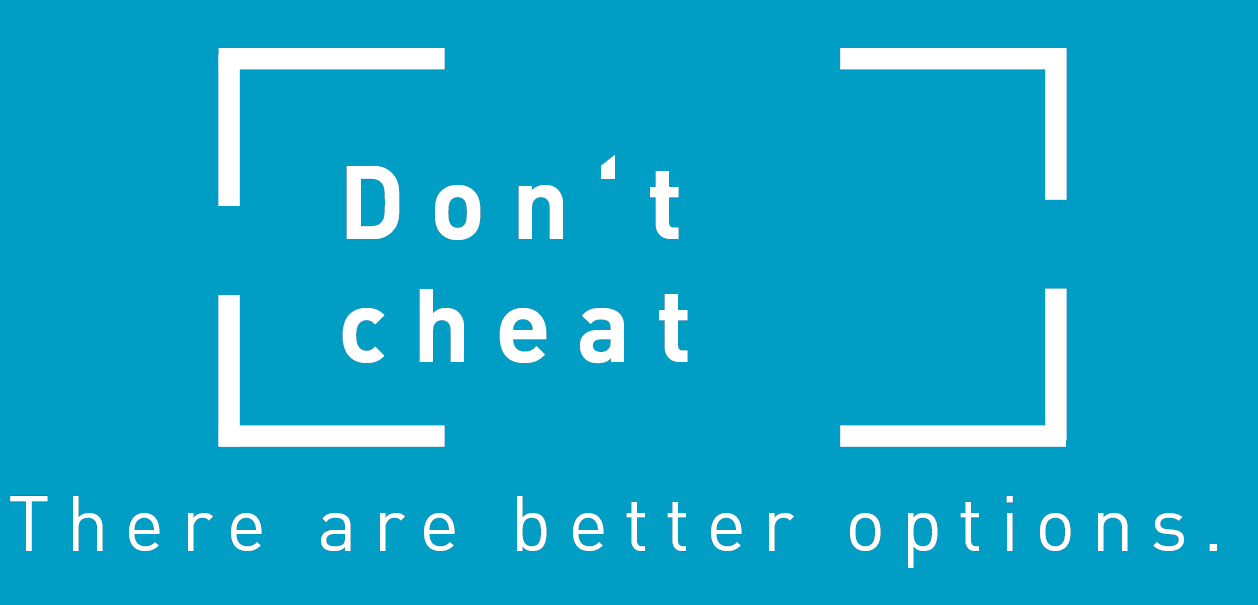Don't cheat!
The Examination Board of the Faculty of Technology and Bionics has started a campaign to raise awareness of academic misconduct and attempted deception in general which we would like to support. All members of the academic community - including you as a student - are obliged to good scientific practice and to avoid scientific malpractice. To learn about academic misconduct and how to avoid it, please read the following information carefully.
What is considered as scientific misconduct?
In general, scientific misconduct or academic misconduct is the violation of scientific rules and standards this includes e.g.
- cheating (circumventing of fair testing procedures or contravention of exam regulations, e.g. copying or using unauthorized material)
- unpermitted collaboration (working together, exchanging solutions, sharing sources, etc. without explicit permission by the examiner)
- personation (e.g. asking someone to write your test)
- plagiarism (presentation or use of information, ideas, images, sentences, findings, etc. as one’s own without appropriate citation)
- fraud (intentional deception or lie such as forgery, data fabrication, etc.)
What are the consequences of scientific misconduct?
Punishment can range from failing an exam up to exmatriculation.
Section 13 (3) & (4) of our General Examination Regulations (RPO) state: “If a student attempts to alter the results of an examination through deception or use of prohibited materials, then the examination shall be assessed as “Failed” (5.0). (...) In the event of repeated or unusually serious examination offences, the bachelor’s or master’s examination may be declared definitively and irreversibly failed. (...) the affected student shall be automatically exmatriculated from the degree programme.”
Section 13 (5) RPO: Intentionally violating any of the aforementioned provisions regarding examination offences is considered a misdemeanour. Pursuant to the PO’s, this misdemeanour may be punishable by a fine of up to EUR 50,000.
SO DON’T LET CHEATING DESTROY YOUR CAREER!
There is no need to cheat. If you're struggling, please get in contact with one of our services and ask for support.
What are the better options?
Exams can be hard and stressful, even more so in pandemic times and you might feel that cheating is the best or even last option. But it is not. Take a look at the support our university has on offer and don’t hesitate to ask for help.
| If you | Contact |
|---|---|
|
have not learned or have not learned enough |
our study guide or postpone your exam |
|
did not understand the lecture, the topic etc. |
our study guide, meet with fellow students |
|
have got problems due to the pandemic, mental or physical health problems |
our psychological councelling service |
|
feel pressure from the family, peers etc. |
our psychological councelling service |
|
are afraid of failing your third attempt |
the student advisory service https://www.hochschule-rhein-waal.de/en/academics/students/student-advisory-service or our study guide |
How do you avoid the suspicion of cheating?
- Always quote ideas, data, assertions ect. that are not your own. Cite sources correctly.
- Follow the instructions of lecturers and examiners.
- If possible and offered, take part in the trial run for online exams, because those who know the situation have less stress.
- If you have technical problems in an online exam, tell the examiners immediately.
- Avoid anything that could be suspicious, such as using a smartwatch during the exam.

